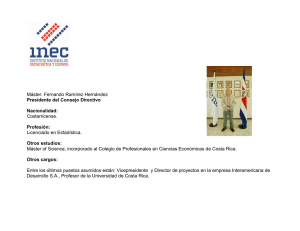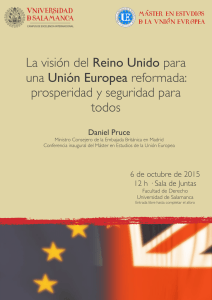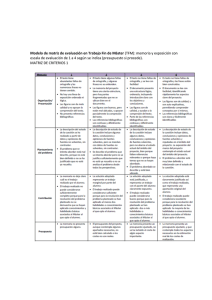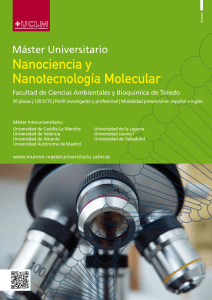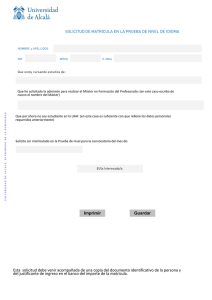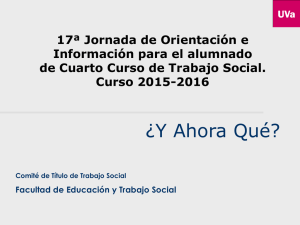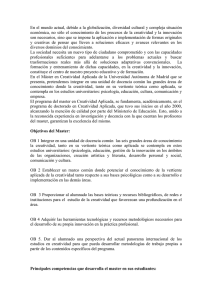ACADEMIC RULES OF MASTER`S DEGREE IN INTERNATIONAL
Anuncio
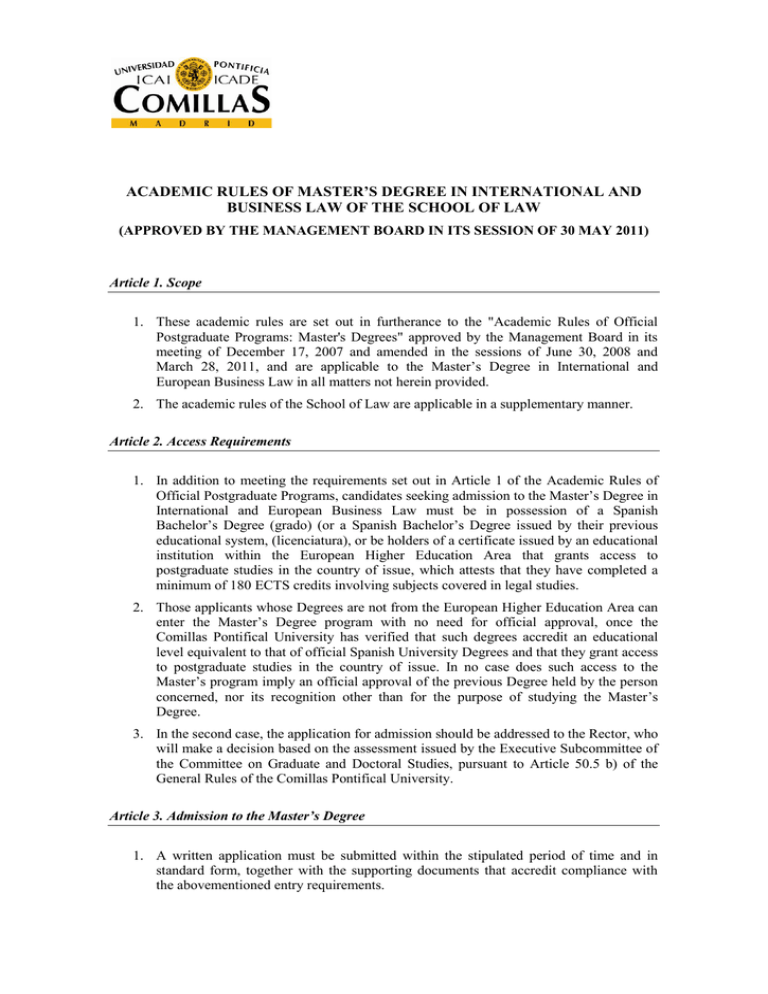
ACADEMIC RULES OF MASTER’S DEGREE IN INTERNATIONAL AND BUSINESS LAW OF THE SCHOOL OF LAW (APPROVED BY THE MANAGEMENT BOARD IN ITS SESSION OF 30 MAY 2011) Article 1. Scope 1. These academic rules are set out in furtherance to the "Academic Rules of Official Postgraduate Programs: Master's Degrees" approved by the Management Board in its meeting of December 17, 2007 and amended in the sessions of June 30, 2008 and March 28, 2011, and are applicable to the Master‟s Degree in International and European Business Law in all matters not herein provided. 2. The academic rules of the School of Law are applicable in a supplementary manner. Article 2. Access Requirements 1. In addition to meeting the requirements set out in Article 1 of the Academic Rules of Official Postgraduate Programs, candidates seeking admission to the Master‟s Degree in International and European Business Law must be in possession of a Spanish Bachelor‟s Degree (grado) (or a Spanish Bachelor‟s Degree issued by their previous educational system, (licenciatura), or be holders of a certificate issued by an educational institution within the European Higher Education Area that grants access to postgraduate studies in the country of issue, which attests that they have completed a minimum of 180 ECTS credits involving subjects covered in legal studies. 2. Those applicants whose Degrees are not from the European Higher Education Area can enter the Master‟s Degree program with no need for official approval, once the Comillas Pontifical University has verified that such degrees accredit an educational level equivalent to that of official Spanish University Degrees and that they grant access to postgraduate studies in the country of issue. In no case does such access to the Master‟s program imply an official approval of the previous Degree held by the person concerned, nor its recognition other than for the purpose of studying the Master‟s Degree. 3. In the second case, the application for admission should be addressed to the Rector, who will make a decision based on the assessment issued by the Executive Subcommittee of the Committee on Graduate and Doctoral Studies, pursuant to Article 50.5 b) of the General Rules of the Comillas Pontifical University. Article 3. Admission to the Master’s Degree 1. A written application must be submitted within the stipulated period of time and in standard form, together with the supporting documents that accredit compliance with the abovementioned entry requirements. 2. Admission to the Master‟s Degree in International and European Business Law is the responsibility of the Dean of the School of Law. A preliminary non-binding report must be issued by the Subcommittee on Admissions, comprising the Master Director and Master Coordinator. 3. For the admission of a candidate in the Master's Degree in International and European Business Law, the following criteria will be taken into account: a) holding an academic record with an average merit pass (7.0) or above in the Law Degree or equivalent studies, unless due to motivation and academic experience, admission is considered advisable; b) demonstrating a knowledge of English corresponding to level C1 ("Effective Operational Proficiency or Upper Intermediate") under the Common European Framework of Reference for Languages. Accreditation can be verified by the submittal of documentation justifying the required level, whether by having passed an ad hoc exam or through personal interview. c) result of the candidate's personal interview with the Director and/or Coordinator of the Master‟s program. d) results of any other tests aimed at verifying his or her (i) knowledge and assimilation of legal matters necessary for successfully completing the Master‟s Degree, (ii) analytical skills, (iii) verbal understanding and (iv) rate of learning. 4. To be considered students of the Master‟s Degree in International and European Business Law, new students must enroll in due time and comply with the requirements determined by the Secretariat General of the Comillas Pontifical University. Article 4. Continuation and duration of studies 1. Loss of student status. Student status is lost for any of the following reasons: a) Completion of studies and obtaining the Master‟s Degree. b) Failure to meet educational requirements. c) Failure to pass the required minimum number of credits in any given term. d) Inability to continue studies as a result of having used up the number of exam sittings. e) Voluntary interruption of studies for one year. f) Completion of studies without having obtained the Master's Degree. 2. Duration of studies. The maximum time for completion of the Master‟s Degree is two consecutive years. Article 5. Schooling 1. Class attendance is mandatory for all students. Failure to attend to more than 15% of classroom hours in any of the two semesters of the Master‟s Degree will result in the expulsion of the student from the School of Law. The Director will report the issue to the Dean of the School of Law. 2. The Director of the Master‟s Degree program, after verifying the lack of attendance of a student in at least 10% of the classroom hours, will make the student aware of the consequences of that absence. 3. In exceptional cases, the student may be exempt from attending classes when there is a circumstance that justifies this decision. In any case, if lack of attendance is for more than 30% of classroom hours, the student must suspend his or her studies on the Master‟s Degree, with the chance to continue them during the following academic year. 4. Requests for exemption of attendance will be addressed to the Dean of the School of Law at the time that the circumstances that justify them occur. The Dean is responsible for granting any such exemptions upon consideration of a report issued by the Director of the Master‟s Degree program, and for determining the conditions, limits and duration of the attendance exemption. 5. The Dean‟s resolution will be notified in writing to the student and to the General Secretary. Article 6. Number of Exam Sittings For all subjects, including the Master‟s Thesis, students are permitted do sit the exam once during the academic year in which they have begun their studies, and once again in the following academic year. Article 7. Evaluation 1. For the evaluation of the acquisition of skills, academic progress and the completion of the Master„s Degree in International and European Business Law, the following method will be used for the grading of courses, modules and Master‟s Thesis. In general, the student must pass the subjects included in the curriculum of the program according to a mixed method of assessment. On the one hand, and in relation to each of the subjects included in the five main modules of the Master‟s Degree (excluding the Master‟s Thesis), professors will assess whether the student has achieved the objectives pursued. On the other, and in addition, students must pass a final test, consisting of writing a Master‟s Thesis and defending it viva voce before an assessment board appointed for that purpose. 2. The evaluation of the courses is conducted according to criteria and methods which focus on continuous assessment and on the measurement of the students‟ effective assimilation of knowledge and skills. Thus each of the subjects will be separately evaluated by the teacher or teachers that have lectured in it. This evaluation will take place throughout the Master‟s Degree (and will be conducted using methods of continuous assessment and end-of-course tests), and will aim to ensure that the student has assimilated the course content in both its theoretical and practical aspects and has developed the corresponding specific skills. Each teacher can assess student performance in each of the subjects in the manner he or she considers most appropriate to the subject and time available, as long as the following criteria are respected: a) The student's active participation in class shall be taken into account and will have a weighting of 10% of the grade. A minimum attendance of 80% of the sessions will be required in each subject in order to be able to take the exam. Student attendance, therefore, is compulsory and will be controlled by the Coordinator of the Master‟s Degree. If the exceptional circumstance of general and continuous absence by a student is detected, the Coordinator will inform the Director of the Program, with the purpose of assessing the situation on individual basis and to take appropriate action. b) The assessment of the continuous work of the student will aggregate all case studies or equivalent activities covered in the course, and will have a weighting of 40% of the subject grade. c) At the end of each subject there will be an end-of course case study. Each professor can choose between (i) the preparation of a take-home case by students (either individually or in groups), followed by its submission in writing and discussion in class, or (ii) in-class resolution of an individual case study. This case will have a weighting of 50% of the grade of the subject. If several teachers give the same subject, the coordinating professor will be responsible for determining the specific criteria for student assessment, the type of end-of-course test, and for aggregating the other professors‟ assessment of the students' continuous work. 3. The evaluation of the five major modules into which the Master‟s Degree is divided will be calculated by the average grade for each of the subjects that make up each module, weighted by the ECTS credits for each subject. To pass a module, the final grade must be equal to or higher than 5.0. Within each module, compensation of grades between subjects is permitted. For compensation within a module to be effective, it will be necessary to have at least a score of 4.0 in each individual subject. Before taking the compensation into account, the student must have passed subjects in that module that represent at least 60% of the credits for that module. If the student fails a subject with a score below 4.0 he or she shall repeat this subject in the following Master‟s course, with a maximum of two exam sittings. If the entire module is failed (i.e. if the weighted average of the subjects included in the module is less than 5.0), the student concerned must repeat all courses that make up the module in the following time the Master‟s Degree is given, regardless of whether or not any subject has been passed individually. If he or she fails to pass any of the subjects of the Master‟s Degree within the limit of the two possible exam sittings, the student may not present or defend the Master‟s Thesis. In this case, the student may, however, request a certificate that accredits the subjects taken and the results achieved. 4. The Master‟s Thesis is a personal project in which students must demonstrate that they can organize, structure, develop and present a full research project on any legal matter of their choice. The ultimate goal is that students acquire and demonstrate a mastery of the chosen topic in the field of international business law. The assessment of the Master‟s Thesis will be conducted by an assessment board appointed for this purpose amongst professors of the University and/or other experts, in which the teacher that has supervised the thesis may not be included. The grade of the Master‟s Thesis will be determined by taking into account both the content of the written work and its viva voce defense. To defend the Master‟s Thesis before the assessment board, permission from the Director of the Master‟s Degree must be obtained, following a previous report by the member of the Master‟s Degree Faculty who has acted as supervisor. If a student does not obtain the necessary authorization for the viva voce defense of the Master‟s Thesis, or if the assessment board grants their work a grade below 5.0, it will be considered that he or she failed the Master‟s Thesis, and he or she will not be able to obtain the title of Master in International and European Business Law. In this case, the student concerned will be able to repeat the research the following time the Master‟s program is given. Failing to pass the Master‟s Thesis within the limit of two exam sittings, the student will not be able to obtain the Master's Degree. In this case, the student may, however, request a certificate that accredits the subjects taken and the results achieved. Article 8. Grades The grades of the subjects, the Master‟s Thesis and the Master's Degree itself, will be transcribed into an official record, according to the following scale: 0-4'9 (fail), 5-6'9 (pass), 7-8'9 (merit pass), 9-10 (outstanding). A grade of 10 (ten) alone is not equal to the granting of honors. Among the students who have achieved a score of 9.0 or above (outstanding) a number of honors‟ distinctions equivalent to five percent (5%) of all students enrolled in the same subject or module may be granted, in which case it must be reflected in the official record. Article 9. Obtaining the Master’s Degree in International and European Business Law 1. Obtaining the Masters‟ Degree in International and European Business Law requires that the student is accredited as having passed all the subjects covered in the curriculum of the program. 2. The final overall assessment of the Master‟s Degree itself will be the result of the weighted average of the grades for the five modules into which the Master is divided and the Master‟s Thesis. The result of the continuous assessment (weighted average of the modules) represents eighty percent (80%) of the evaluation of the Master‟s Degree. The remaining twenty percent (20%) corresponds to the grade of the Master‟s Thesis. Rounding up or down of the grade will only be applicable in the determination of the global final score of the Master‟s Degree. 3. A grade below 5.0 in the Master‟s Thesis will prevent the student from obtaining the title. Article 10. Diploma The diploma of Master in International and European Business Law shall be issued in accordance with the provisions of Royal Decree 1002/2010, of 5 August. NORMAS ACADÉMICAS DEL MÁSTER UNIVERSITARIO EN INTERNATIONAL AND EUROPEAN BUSINESS LAW DE LA FACULTAD DE DERECHO (Aprobadas en Junta de Gobierno de 30 de mayo de 2011) Artículo 1. Ámbito de aplicación 1. Las presentes normas académicas se dictan en desarrollo de las “Normas Académicas de Enseñanzas Oficiales de Postgrado: Máster Universitario” aprobadas por la Junta de Gobierno en la sesión celebrada el 17 de diciembre de 2007 y modificadas en las sesiones de 30 de junio de 2008, 20 de marzo de 2010 y de 28 de marzo de 2011, y aplicables al Máster Universitario en International and European Business Law, en todo lo no previsto en las presentes. 2. Las normas académicas de la Facultad de Derecho se aplicarán con carácter supletorio. Artículo 2. Requisitos de acceso al Máster 1. Quienes soliciten su admisión al Máster Universitario en International and European Business Law, además de satisfacer los requisitos que se establecen en el artículo 1 de las normas académicas de los programas oficiales de postgrado, deberán estar en posesión de un título de Grado español (o del título de Licenciado del sistema educativo anterior u otro expedido por una institución de educación del Espacio Europeo de Educación Superior que faculte en el país expedidor del título el acceso a enseñanzas de Máster), en el que hayan cursado un mínimo de 180 créditos dedicados a materias de carácter jurídico. 2. También podrán acceder al Máster los titulados conforme a sistemas educativos ajenos al Espacio Europeo de Educación Superior sin necesidad de homologación de sus títulos, previa comprobación por la Universidad de que aquéllos acreditan un nivel de formación equivalente a los correspondientes títulos universitarios oficiales españoles y que facultan en el país expendedor del título para el acceso a enseñanzas de postgrado. El acceso por esta vía no implica, en ningún caso la homologación del título previo del que esté en posesión el interesado, ni su reconocimiento a otros efectos que el de cursar las enseñanzas del Máster. 3. En el segundo caso, la solicitud de admisión deberá dirigirse al Rector, quien resolverá a la vista del informe emitido por la Subcomisión Delegada de la Comisión de Postgrado y Doctorado, conforme a lo establecido en el artículo 50.5 b) del Reglamento General. Artículo 3. Admisión en el Máster 1. La solicitud de admisión deberá presentarse en el plazo señalado al efecto, en modelo normalizado, y acompañada de todos los documentos acreditativos del cumplimiento de los requisitos de acceso. 2. La admisión al Máster Universitario en International and European Business Law es competencia del Decano de la Facultad de Derecho, previo informe no vinculante emitido por la Subcomisión de Admisiones, integrada por el Director y el Coordinador del Máster. 3. Para la admisión de un candidato en el Máster Universitario en International and European Business Law, se tendrán en cuenta los siguientes criterios: a) Expediente académico con media de notable (7,0) o superior en el Grado o su equivalente; salvo que, en atención a su motivación y trayectoria se considere adecuada su admisión. b) Acreditar un conocimiento suficiente del idioma inglés correspondiente al nivel C1 (“dominio operativo eficaz” / “Effective Operational Proficiency or upper intermediate”) conforme al marco común europeo de referencia para las lenguas. La acreditación podrá verificarse bien mediante la presentación de la documentación justificativa del nivel exigido, bien mediante la superación de un examen ad hoc, bien mediante la oportuna entrevista personal. c) Resultado de la entrevista personal del candidato, realizada ante el Director y/o el Coordinador del Máster. d) Cualesquiera otras pruebas dirigidas a verificar (i) su grado de conocimiento y asimilación de las materias jurídicas necesarias para cursar con éxito el Máster, (ii) su capacidad de análisis, (iii) su comprensión verbal y (iv) su ritmo de aprendizaje. 4. Para ser considerado alumno ordinario del Máster Universitario en International and European Business Law, el alumno de nuevo ingreso deberá formalizar la matrícula en los plazos y con los requisitos determinados por la Secretaría General de la Universidad Pontificia Comillas. Artículo 4. Continuidad de los estudios y permanencia 1. Pérdida de la condición de alumno. La condición de alumno se pierde por alguna de las siguientes causas: a) Terminación de los estudios y obtención del título de Máster. b) Incumplimiento de los requisitos de escolaridad. c) No superación del número de créditos requerido en cada uno de los períodos lectivos. d) Imposibilidad de continuar los estudios comenzados como consecuencia de haber agotado el alumno el número de convocatorias. e) Interrupción de los estudios por decisión del alumno durante un año. f) Finalización de los estudios sin haber obtenido el título del Máster. 2. Permanencia. El tiempo máximo de permanencia de un alumno para la finalización del Máster es de dos años consecutivos. Artículo 5. Escolaridad 1. La asistencia a clase es obligatoria para todos los alumnos. La inasistencia a más del 15% de las horas lectivas impartidas en el Máster, en alguno de los dos semestres, dará lugar a la baja del alumno en el Centro. El Director del Máster dará cuenta de esta circunstancia al Decano de la Facultad de Derecho. 2. El Director del Máster, una vez comprobada la falta de asistencia del alumno en al menos un 10% de las clases, pondrá en conocimiento del alumno las consecuencias de dicha inasistencia. 3. En casos excepcionales, podrá concederse dispensa de escolaridad cuando concurran circunstancias acreditadas que justifiquen esta resolución. Si la falta de escolaridad fuera superior al 30% de las clases el alumno deberá suspender sus estudios en el Máster pudiendo continuarlos el curso académico siguiente. 4. Las solicitudes de dispensa serán dirigidas, en el momento en que concurran las circunstancias que la justifican, al Decano de la Facultad de Derecho, a quien corresponde concederlas previo informe del Director del Máster, así como determinar las condiciones, límites y duración de la concesión. 5. La resolución será comunicada por escrito al interesado y a Secretaría General. Artículo 6. Convocatorias El alumno dispone para todas las asignaturas del Máster, incluido el trabajo fin de Máster, de una convocatoria en el curso académico en el que haya comenzado sus estudios y de una segunda convocatoria en el curso académico siguiente. Artículo 7. Evaluación 1. Para la evaluación de la adquisición de competencias, del aprovechamiento y de la superación del Máster Universitario en International and European Business Law, se seguirá la siguiente estructura general de evaluación de las asignaturas, módulos y trabajo fin de Máster. Con carácter general, el alumno deberá acreditar la superación de las enseñanzas vinculadas al programa mediante un sistema de evaluación de carácter mixto. Por una parte, en relación con cada una de las materias englobadas en los cinco módulos principales del Máster (excluido el trabajo fin de Máster), los profesores valorarán si el alumno ha alcanzado los objetivos de aprendizaje propios de éstas. Por otra parte, el alumno deberá superar una prueba final, consistente en la elaboración del trabajo fin de Máster y su defensa oral ante un tribunal calificador nombrado al efecto. 2. La evaluación de las asignaturas se realizará conforme a criterios y métodos centrados en la evaluación continua y medición de la asimilación efectiva de conocimientos y competencias por parte de los alumnos. En este sentido, cada una de las asignaturas será objeto de evaluación separada por el profesor o profesores que la hayan impartido. Esta evaluación, que tendrá lugar durante el desarrollo del Máster (y se realizará mediante el uso de métodos de evaluación continua y de pruebas de fin de asignatura), perseguirá asegurar que el alumno domina el contenido de la asignatura tanto en sus aspectos teóricos como prácticos, y ha desarrollado las competencias específicas asociadas. Cada profesor podrá valorar el rendimiento de los alumnos en cada una de las asignaturas del modo que estime más adecuado a la materia y tiempo disponible, siempre que respete los siguientes criterios básicos: (a) La asistencia del alumno a clase deberá tenerse en cuenta y tendrá una ponderación del 10% de la nota de la asignatura. Será necesario cubrir una asistencia mínima del 80% de las sesiones correspondientes a cada asignatura para poder realizar la prueba de fin de asignatura. La asistencia del alumno, por tanto, será obligatoria y será controlada por el Coordinador del Máster. En caso de detectar circunstancias excepcionales de inasistencia generalizada o continuada por parte de un alumno, el Coordinador dará oportuno traslado al Director del Programa, a efectos de valorar la situación de manera individualizada y tomar las medidas oportunas. (b) La evaluación del trabajo continuado del alumno se realizará de manera agregada sobre el conjunto de los supuestos o casos cubiertos en la asignatura, que tendrá una ponderación del 40% de la nota de la asignatura. (c) Al final de cada asignatura se realizará un caso de fin de asignatura, pudiendo elegir cada profesor entre la preparación previa por el alumno (ya sea con carácter individual o en grupo), entrega por escrito y discusión en clase de un caso práctico, o la realización en clase de un caso práctico individual. Este caso de fin de asignatura tendrá una ponderación del 50% de la nota de la asignatura. En caso que varios profesores impartan una misma asignatura, será el profesor responsable de la asignatura quien determine los criterios específicamente aplicables para la evaluación del alumno, realice la prueba de fin de asignatura, y coordine al resto de profesores que hayan impartido esa asignatura para la evaluación del trabajo continuado de los alumnos. 3. La evaluación de los cinco grandes módulos en que se divide el Máster se calcula por la media de las asignaturas que integran cada módulo, ponderada por los créditos ECTS de cada asignatura. Para aprobar un módulo, su calificación final debe ser igual o superior a 5,0. Dentro de cada módulo, se permite la compensación de asignaturas entre sí. Para que la compensación dentro de un módulo sea posible, en cada asignatura se deberá obtener al menos una calificación de 4,0. En todo caso, antes de tener en cuenta la compensación, se deberá haber aprobado directamente asignaturas de ese módulo que representen, como mínimo, el 60% de los créditos de ese módulo. En caso de que alguna asignatura quedara suspensa y por debajo del 4,0, el alumno afectado deberá repetir dicha asignatura en la siguiente edición del Máster, hasta un máximo de dos convocatorias posibles. En caso de que un módulo entero quedara suspenso (esto es, la media ponderada de las asignaturas incluidas en el módulo fuera inferior a 5,0), el alumno afectado deberá repetir todas las asignaturas que integran dicho módulo, aunque alguna de ellas hubiera sido aprobada de manera individual. En caso de no aprobar la totalidad de las asignaturas del Máster dentro del límite de dos convocatorias posibles, el alumno no podrá presentar ni defender el trabajo fin de Máster. En tal caso, el estudiante podrá, no obstante, solicitar la expedición de un certificado en el que se deje constancia de las materias cursadas y de los resultados obtenidos. 4. El trabajo fin de Máster es un proyecto personal en el que el alumno debe demostrar que sabe organizar, estructurar, desarrollar y presentar una investigación sobre alguna materia jurídica. El objetivo fundamental es que el estudiante adquiera y demuestre un dominio profundo del campo elegido en el ámbito del derecho de los negocios internacionales. La evaluación del trabajo fin de Máster corresponderá a un tribunal nombrado al efecto entre profesores de la Universidad y/u otros expertos, entre los que no podrá incluirse el tutor de trabajo fin de Máster que haya supervisado a cada alumno en concreto. La nota del trabajo fin de Máster ponderará tanto el contenido del trabajo escrito como su defensa oral. Para la defensa del trabajo fin de Máster ante el tribunal será preceptiva la autorización del Director del programa, previo informe del tutor de trabajo fin de Máster. En caso de que un alumno no obtenga la preceptiva autorización para la defensa del trabajo fin de Máster, o el tribunal califique su trabajo con una nota inferior a 5,0, se considerará que ha suspendido el trabajo fin de Máster y no estará en condiciones de obtener el título. En este caso, el alumno afectado deberá repetir el trabajo de investigación en la edición consecutiva del Máster. En caso de no aprobar el trabajo fin de Máster dentro del límite de dos convocatorias posibles, el alumno no podrá obtener el título de Máster. En tal caso, el estudiante podrá, no obstante, solicitar la expedición de un certificado en el que se deje constancia de las materias cursadas y de los resultados obtenidos. Artículo 8. Calificaciones Las calificaciones de las asignaturas, el trabajo fin de Máster y el título de Máster, se recogerán en un acta oficial, de acuerdo con la siguiente escala: 0-4‟9 suspenso; 5-6‟9 aprobado; 7-8‟9 notable; 9-10 sobresaliente. La nota 10 (diez) no equivale por sí sola a la concesión de Matrícula de Honor. Entre los alumnos que hayan obtenido sobresaliente, se podrán otorgar un número de Matrículas de Honor, equivalente al 5 % del conjunto de los alumnos matriculados en la misma asignatura o módulo haciéndolo constar en el acta oficial. Artículo 9. Obtención del título de Máster Universitario en International and European Business Law 1. La obtención del título de Máster Universitario en International and European Business Law exige la acreditación de la superación de las enseñanzas por parte del alumno. 2. La evaluación global final del máster resultará de la media ponderada de las calificaciones correspondientes a los cinco grandes módulos en que se divide el Máster y al trabajo fin de Máster. La media ponderada de los módulos representará el ochenta por ciento (80%) de la evaluación del Máster. El veinte por ciento (20%) restante corresponderá a la nota del trabajo fin de Máster. Sólo se aplicará un criterio de redondeo en la determinación de la nota global del Máster. 3. La calificación del trabajo fin de Máster con una nota inferior a 5 impedirá la obtención del título de Máster. Artículo 10. Expedición de títulos El título de Máster Universitario en International and European Business Law se expedirá con arreglo a lo dispuesto en el RD 1002/2010, de 5 de agosto.
